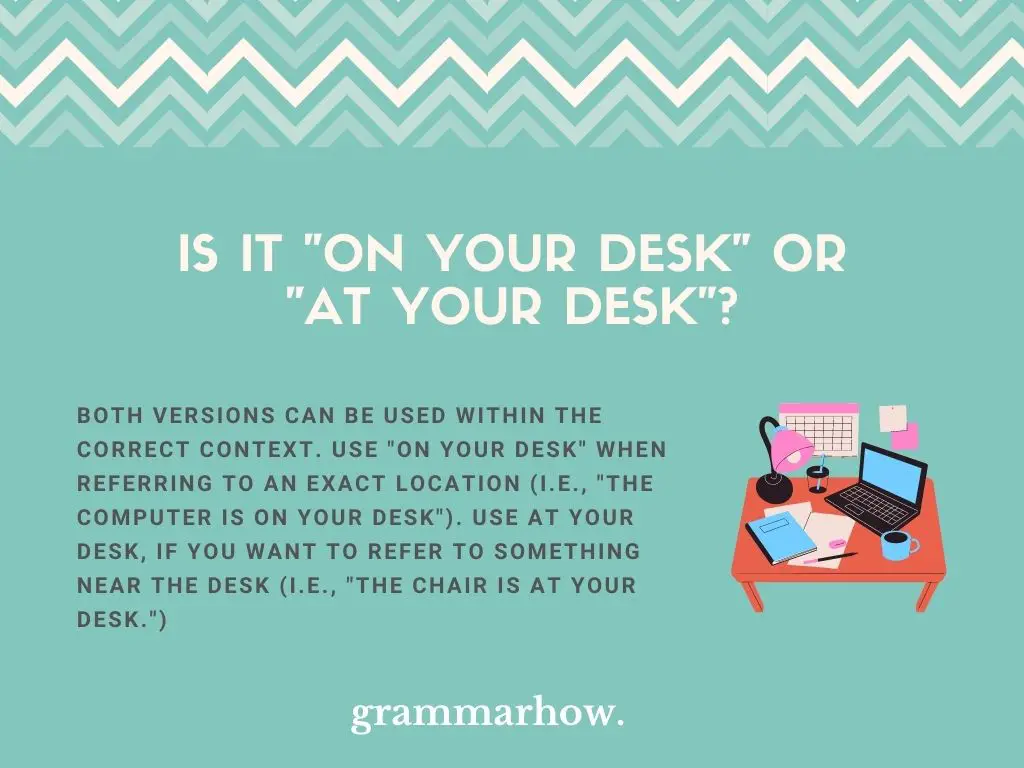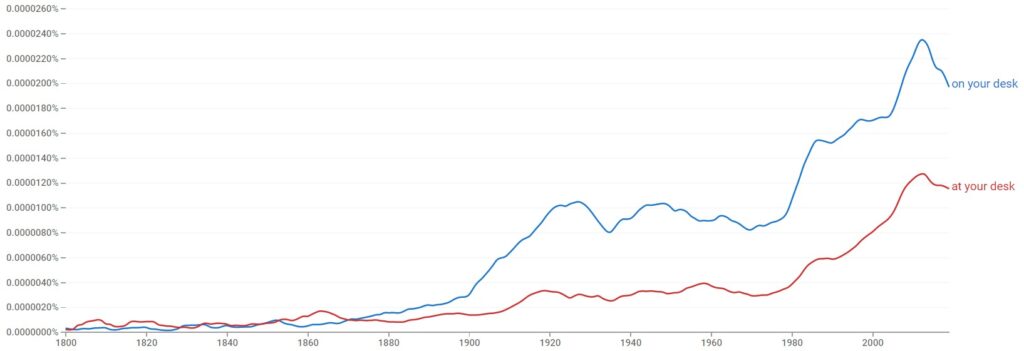On a daily basis prepositions confuse even some of the best writers. The prepositions “on” and “at” are no exception. Often you hear people using these two phrases interchangeably or in the wrong situation. Here we use the examples of “on your desk” and “at your desk” to teach you the proper context of each and help you to apply it throughout your writing.
Is it “On Your Desk” or “At Your Desk”?
Both versions can be used within the correct context. Use “on your desk” when referring to an exact location (i.e., “the computer is on your desk”). Use at your desk, if you want to refer to something near the desk (i.e., “the chair is at your desk.”)

To break it down more simply, it really depends on where the object or person to which you are referring is physically positioned in relation to the desk. That question would be the first that you want to ask yourself before writing the sentence – where is the subject located compared to the desk? If the subject is definitely on the surface of the desk, use “on.” Otherwise, “at” is more likely to be the proper preposition.
What Does “On Your Desk” Mean?
“On Your Desk” means that you are referring to an object that is located somewhere on the top of your physical desk.
You would say that something is “on your desk” if it is, quite literally, placed on top of your desk.
The object that you are talking about when using this preposition would be touching the surface of your desk. For example, it would be something such as your computer or a piece of paper. It means that the object directly touches the surface of the desk.
Therefore, you would not likely use this preposition to describe a person in relation to the location of their desk. In instances where you want to describe people, this preposition just wouldn’t make sense in most cases.
To illustrate this point, if someone is looking for Stacy and you tell them she is “on her desk,” you would be wrong, unless Stacy were, in fact, actually sitting on the top of her desk. Pretty straightforward, right?
Examples of How to Use “On Your Desk” In A Sentence
The best way to grow comfortable with deciding which prepositional phrase works the best in a situation is to look at some basic examples of sentences.
Here are a few examples where it would be appropriate to use the phrase “on your desk”:
- I left my notebook on your desk after the meeting this morning.
- Can I put the assignment on your desk before I leave this afternoon?
- The plant you have on your desk looks like it needs some water.
- Make sure you leave the money you owe me on your desk before you leave the office today.
- Put the keys on my desk so I can find them easily when I get back.
- The computer on my desk has been giving me issues lately.
Other similar examples using the preposition “on,” include:
- The remote control is on the coffee table.
- The delivery driver left the package on the front stairs.
- Sit on the bleachers during the baseball game.
- We put the ornaments on the Christmas tree.
What Does “At Your Desk” Mean?
“At your desk” means that the object to which you are referring is somewhere near the general area of the desk. You can also use this preposition when you are referring to people.
We touched on this briefly in the example above, but it is important to know that this preposition gives you more leeway in where the object to which you are referring is located. It does not actually have to be on the surface of the desk.
For example, If you are looking to say that something is simply near the desk, on a shelf behind the desk, or in the same room as the desk, use the phrase “at your desk” instead of “on your desk.” The word “at” implies something is in a particular place or occupying a space in a specific location.
Because of this designation, this preposition applies to more than just objects, but to people as well. You can accurately say that a person is “at their desk,” because it implies that they are somewhere in close proximity to the location of the desk. They could be in front of it, sitting behind it, or sitting near it.
So if someone asks you where they can find Stacy, and you say she’s “at her desk,” you would be absolutely correct.
Examples Of How To Use “At Your Desk” In A Sentence
Again, here are some basic example sentences to increase your familiarity and comfort level.
Here are some examples that show the proper use of “at your desk:”
- I threw it in the trash can at your desk this morning.
- Let’s meet at my desk before we head to lunch.
- The book you’re looking for is on the shelf at my desk.
- We talked about it in detail when we were at your desk the other day.
Other similar examples using the preposition “at,” include:
- We will sit at the kitchen table to eat dinner tonight.
- The delivery driver left the package at the end of the driveway.
- The team will meet at the bleachers before the start of the game.
- They built a new house at the end of our street.
Is “On Your Desk” Or “At Your Desk” Used the Most?
According to the Google Ngram Viewer, which analyzes how often certain phrases are found in books throughout the years, both “on your desk” and “at your desk” historically were used at about the same rate for a long time.

It was only around the early 1900s that a distinct separation started to appear, and “on your desk” started to come into view more often.
This trend appears to have held steady up until modern times, with “on your desk” remaining the more frequently used of the prepositional phrases, rising sharply after the 1980s.
During this period, the phrase “at your desk” started to trend upward as well, but still represented a smaller percentage of overall usage.
You can almost wonder if it’s because people tended to use the phrase incorrectly in their writing, or there really just were more instances when something was actually “on your desk.”
You may also like: “In My Computer” Or “On My Computer” – Easy Preposition Guide

Martin holds a Master’s degree in Finance and International Business. He has six years of experience in professional communication with clients, executives, and colleagues. Furthermore, he has teaching experience from Aarhus University. Martin has been featured as an expert in communication and teaching on Forbes and Shopify. Read more about Martin here.
